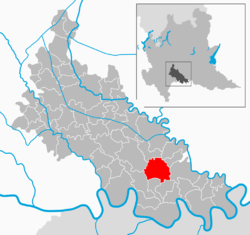Codogno
| Codogno | ||
|---|---|---|
| Comune | ||
| Città di Codogno | ||

The old Soave Hospital in Codogno.
|
||
|
||
 |
||
| Location of Codogno in Italy | ||
| Coordinates: 45°9′N 9°42′E / 45.150°N 9.700°E | ||
| Country | Italy | |
| Region | Lombardy | |
| Province / Metropolitan city | Lodi (LO) | |
| Frazioni | Maiocca, Triulza | |
| Government | ||
| • Mayor | Vincenzo Ceretti | |
| Area | ||
| • Total | 20 km2 (8 sq mi) | |
| Elevation | 58 m (190 ft) | |
| Population (30 November 2012) | ||
| • Total | 15,462 | |
| • Density | 770/km2 (2,000/sq mi) | |
| Demonym(s) | Codognesi | |
| Time zone | CET (UTC+1) | |
| • Summer (DST) | CEST (UTC+2) | |
| Postal code | 26845 | |
| Dialing code | 0377 | |
| Patron saint | San Biagio | |
| Saint day | 3 February | |
| Website | Official website | |
Codogno (Cudogn in the Lodi dialect) is a town and comune of 15,462 inhabitants in the province of Lodi, Lombardy, Italy. It is the main center of the plain known as Basso Lodigiano, which has about 90,000 inhabitants. It received the honorary title of city with a presidential decree on June 26, 1955.
There is evidence of a settlement dating back to Roman penetration of Gaul, where it is thought to have been used as a castrum. The Latin form of the name Codogna was "Cothoneum" and is believed to derive from the name of the consul Aurelius Cotta, conqueror of the Gauls, who inhabited these lands at that time. However, it is not until 997 C.E. that the name of the town is found in print. It is mentioned in a charter of Emperor Otto II. It has also been suggested that the name may be derived from the cydonia apple, or the melo cotogno, a species of quince, both common in this region.
In 1441, after long jurisdiction by the bishops of Lodi, the settlement was sold to the Venetian family Fagnani by Filippo Maria Visconti, the Duke of Milan and subsequently, in 1450, to Gian Giacomo Trivulzio under whom it was granted the status of borgo (, a fortified town) by Francesco I Sforza.
During this time, Codogno had developed a thriving commercial life, and having a fiercely autonomous spirit, they wished to be independent of Trivulzio. The Codognesi sought inclusion in the jurisdiction of Piacenza in order to have a wider and freer market. Thus, by an act ratified on April 21, 1492, they became citizens of Piacenza. To demonstrate their gratitude, they altered their coat-of-arms to show the Roman she-wolf (the symbol of Piacenza), tied to a quince tree (the symbol of Codogno) with a gold chain.
...
Wikipedia


